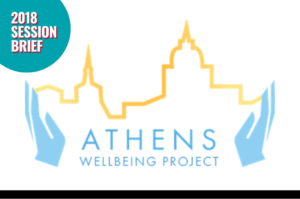By Mae Eldahshoury
 We can collect all the data in the world, but without designing and implementing policies, how useful can that data really be?
We can collect all the data in the world, but without designing and implementing policies, how useful can that data really be?
New data collection and implementation methods are two integral components pushing us to craft meaningful partnerships within our communities. At least that’s what Grace Bagwell Adams, assistant professor in UGA’s College of Public Health and principal investigator of the Athens Wellbeing Project, suggests is the driving force towards improving community health outcomes.
Adams presented at an afternoon session, “How to Win Partners & Influence Policy,” during the State of the Public Health’s Conference, held Oct. 18 on the UGA campus. Her presentation explored the partnership between the Athens Wellbeing Project and Envision Athens, a community-wide effort strategizing the community and economic development in Athens for the next 20 years.
“Our hope is that we have changes in outputs – changes in service delivery methods, mechanisms and target groups,” said Adams.
The Athens Wellbeing Project (AWP) serves to empower Athens with meaningful data in order to improve decisions and service delivery that impact the quality of life. Its core focuses on collecting information over a variety of domains, or issue areas, such as housing, health, safety and lifelong learning.
Because the Athens Wellbeing Project is not a policy-making organization, its partnership with Envision Athens is crucial to the development of long-lasting policies. “We have to take a mixed-methods approach,” said Adams.
AWP’s approach is three-tiered: representative sampling, collaboration across service areas and transparency in sharing results with the public. It aims to make data a public good and allow communities to understand how it impacts their daily lives.
Prior to her collaboration with Envision Athens, Adams found that many Athens organizations were engaged in needs assessments but were collecting data separately, proving to be inefficient. When these institutions come together, however, data can be collected on issues across the spectrum and allow organizations to work collectively on solutions.
Highlighted in the presentation were case studies on agriculture and behavioral health that proved the success of new partnerships.
The first case study focused on improving food security in Athens. Food swamps, a term coined in the public health sphere, were districts that contained little to no grocery stores with nutritious foods but had an abundance of fast-food restaurants. In response to this data, St. Mary’s Mobile Market changed its route to deliver more fresh foods to these food swamps.
Similarly, the case study on behavioral health found that areas where families could not afford health insurance or did not have access to mental health resources were supported by local hospitals and public safety groups.
These two issues, Adams explained, were only samples of how the utilization of data and partnerships can improve health outcomes.
“We finally have a mechanism to put the data to work. The vehicle is the strategic action plan that’s emerged at the local level,” Adam concludes. “The thing that’s going to make us the most effective is being inclusive of the partners we have at the table to move forward.”
